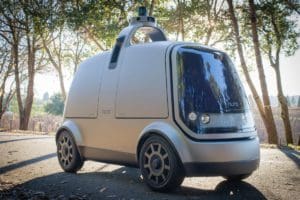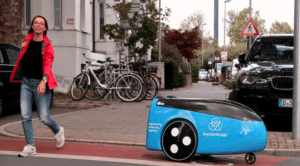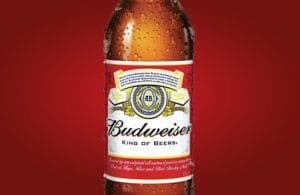 The time has finally come for Super Bowl weekend. All the pieces are in place – the teams, the media, the fans, the halftime entertainment, the security, and all the other logistics that need to be in place for the Super Bowl to actually happen. While I am clearly hoping for a Patriots victory, and for the dynasty to continue, I realize that I have become completely spoiled. This is the first year that my 7-year old has been into the Patriots enough to watch full games, including his first playoff game in the AFC Championship. When the Pats were losing in the fourth quarter, he was burying his head in the couch, so afraid that they would lose. He constantly asked me if I thought they would win. “Of course I do” was my response. And I really did. That’s what happens when they keep winning. So hopefully he will see his first Super Bowl victory for the Pats in its entirety. But if not, there’s always next year. And the year after. And now on to this week’s logistics news.
The time has finally come for Super Bowl weekend. All the pieces are in place – the teams, the media, the fans, the halftime entertainment, the security, and all the other logistics that need to be in place for the Super Bowl to actually happen. While I am clearly hoping for a Patriots victory, and for the dynasty to continue, I realize that I have become completely spoiled. This is the first year that my 7-year old has been into the Patriots enough to watch full games, including his first playoff game in the AFC Championship. When the Pats were losing in the fourth quarter, he was burying his head in the couch, so afraid that they would lose. He constantly asked me if I thought they would win. “Of course I do” was my response. And I really did. That’s what happens when they keep winning. So hopefully he will see his first Super Bowl victory for the Pats in its entirety. But if not, there’s always next year. And the year after. And now on to this week’s logistics news.
- Amazon expands delivery trial that could hurt UPS, FedEx
- Target launching same-day delivery in first markets in February
- Zara unveils click and collect store
- Nuro unveils self-driving delivery vans
- thyssenkrupp tests self-driving robot for ‘last mile’ delivery of elevator parts
- Nikola Motor Company announces $1 billion Arizona plant
- Green logo for Budweiser as brewer taps into US wind power
![]() Amazon is expanding a delivery service trial that could put a squeeze on both UPS and FedEx. The program is called “FBA Onsite” and seeks to speed up delivery timeframes for groceries, cleaning products, and other items sold by merchants without an influx of additional inventory at Amazon’s warehouses and distribution centers. The program enables Amazon to oversee the pickup of packages from third party merchants that sell items on Amazon.com, and deliver these items to customers. Amazon controls the delivery of these items, so while it can still use UPS and FedEx, it ultimately has the final say in how items are delivered. Amazon is currently recruiting more merchants to join the program.
Amazon is expanding a delivery service trial that could put a squeeze on both UPS and FedEx. The program is called “FBA Onsite” and seeks to speed up delivery timeframes for groceries, cleaning products, and other items sold by merchants without an influx of additional inventory at Amazon’s warehouses and distribution centers. The program enables Amazon to oversee the pickup of packages from third party merchants that sell items on Amazon.com, and deliver these items to customers. Amazon controls the delivery of these items, so while it can still use UPS and FedEx, it ultimately has the final say in how items are delivered. Amazon is currently recruiting more merchants to join the program.
 Since Target announced its acquisition of Shipt, a same-day, crowd-sourced delivery platform, in December, the company has been planning a roll-out of same-day delivery services. Earlier this week, Target announced that the service will be available in its first markets starting this month, including in Birmingham, AL and South Florida. The service will then be rolled out to other markets, with Target planning to offer the service at nearly half of its stores by the end of March, and almost all stores by the December. A Shipt membership regularly costs $99 or a $14 per month on orders more than $35. Deliveries of less than $35 have a fee of $7 per order and Shipt prices vary slightly from in-store prices.
Since Target announced its acquisition of Shipt, a same-day, crowd-sourced delivery platform, in December, the company has been planning a roll-out of same-day delivery services. Earlier this week, Target announced that the service will be available in its first markets starting this month, including in Birmingham, AL and South Florida. The service will then be rolled out to other markets, with Target planning to offer the service at nearly half of its stores by the end of March, and almost all stores by the December. A Shipt membership regularly costs $99 or a $14 per month on orders more than $35. Deliveries of less than $35 have a fee of $7 per order and Shipt prices vary slightly from in-store prices.
![]() Zara has unveiled a new click and collect pop-up store in east London while its flagship store is being refurbished. The store is a temporary location, and will remain open until May, when the flagship store re-opens. This is a trial run to show customers the type of experience they will have when the flagship store re-opens. Aside from click and collect, the store will feature mobile handhelds that store associates can use to place online orders for customers, and allow customers to decide a timeframe for fulfillment. The new flagship store will feature an entire section dedicated to online orders.
Zara has unveiled a new click and collect pop-up store in east London while its flagship store is being refurbished. The store is a temporary location, and will remain open until May, when the flagship store re-opens. This is a trial run to show customers the type of experience they will have when the flagship store re-opens. Aside from click and collect, the store will feature mobile handhelds that store associates can use to place online orders for customers, and allow customers to decide a timeframe for fulfillment. The new flagship store will feature an entire section dedicated to online orders.
 Silicon Valley start-up Nuro, which launched about 18 months ago, has been very secretive in its business plans up until now. The company has debuted its self-driving delivery van, and has grand plans to disrupt the delivery market. While it is certainly not the first start-up (or experienced manufacturer) to launch an autonomous van, this one is a little different. The van weighs approximately 1500 pounds, most of which is in the battery pack that powers its electric motor. While it is roughly the same length and height of a traditional SUV, it is only 3.5 feet wide. It is slower moving, which combined with its narrow design, allows for additional safety features such as avoiding pedestrians without leaving its lane. The company’s goal is to have its vehicles on the road sometime later this year.
Silicon Valley start-up Nuro, which launched about 18 months ago, has been very secretive in its business plans up until now. The company has debuted its self-driving delivery van, and has grand plans to disrupt the delivery market. While it is certainly not the first start-up (or experienced manufacturer) to launch an autonomous van, this one is a little different. The van weighs approximately 1500 pounds, most of which is in the battery pack that powers its electric motor. While it is roughly the same length and height of a traditional SUV, it is only 3.5 feet wide. It is slower moving, which combined with its narrow design, allows for additional safety features such as avoiding pedestrians without leaving its lane. The company’s goal is to have its vehicles on the road sometime later this year.
 Interest in delivery robots continues to heat up, with vertical transportation giant thyssenkrupp unveiling a self-driving delivery robot for field technicians. The new robot, co-developed with software maker TeleRetail, is designed to bring spare parts and materials to field technicians working on elevators and escalators in dense urban areas. Typically, if a technician needs a spare part, they need to drive back to the warehouse to get it or have it delivered by a colleague. Using thyssenkrupp’s new robots, technicians can have the parts delivered faster, as they do not have to deal with traffic congestion. The robots are 33 inches wide, can travel on sidewalks, and can carry payloads weighing up to 77 pounds.
Interest in delivery robots continues to heat up, with vertical transportation giant thyssenkrupp unveiling a self-driving delivery robot for field technicians. The new robot, co-developed with software maker TeleRetail, is designed to bring spare parts and materials to field technicians working on elevators and escalators in dense urban areas. Typically, if a technician needs a spare part, they need to drive back to the warehouse to get it or have it delivered by a colleague. Using thyssenkrupp’s new robots, technicians can have the parts delivered faster, as they do not have to deal with traffic congestion. The robots are 33 inches wide, can travel on sidewalks, and can carry payloads weighing up to 77 pounds.
As more companies seek out alternative-fuel freight trucks, Nikola Motor Company has unveiled plans for a new $1 billion manufacturing hub for its hydrogen-fueled semi-trucks. The facility will be located in the Phoenix area, and according to Nikola, will be the one of the largest stand-alone manufacturing facilities for next-generation semis at 500 acres. This news comes on the heels of announcements from Tesla, Navistar, and Volkswagen to begin production on alternative-fuel trucks as well. Nikola said that it plans to begin construction in 2019, with the first trucks rolling off assembly lines sometime in 2021. So far, the company has received 8,000 advanced orders for its new trucks.
 Speaking of alternative energy sources, Budweiser has switched all of its US brewing to renewable electricity and is adding a clean energy logo to its labels. This is all part of Anheuser-Busch InBev’s global effort to use green power. The symbol will say “100percent renewable electricity” and will be added to all bottles and cans. AB-InBev, which is the world’s largest brewer, is one of more than 100 multi-national companies to have committed to using renewable energy as part of the Paris accord. The company hopes that other than combatting pollution and climate change, the use of renewable energy will ring a lift to Budweiser’s sales, which has seen a dip recently.
Speaking of alternative energy sources, Budweiser has switched all of its US brewing to renewable electricity and is adding a clean energy logo to its labels. This is all part of Anheuser-Busch InBev’s global effort to use green power. The symbol will say “100percent renewable electricity” and will be added to all bottles and cans. AB-InBev, which is the world’s largest brewer, is one of more than 100 multi-national companies to have committed to using renewable energy as part of the Paris accord. The company hopes that other than combatting pollution and climate change, the use of renewable energy will ring a lift to Budweiser’s sales, which has seen a dip recently.
Want to learn more about how a TMS can help you improve customer service? Join ARC Advisory Group’s Steve Banker, Sephora’s Jose Flores, and MercuryGate’s Hope Federer to learn more.
Want to benchmark your warehouse labor management performance? Take our new survey to find out how you compare with your peers.
That’s all for this week’s logistics news. Enjoy the weekend and the Super Bowl. Cue the kick-off and enjoy the song of the week, AC/DC’s Hell’s Bells.
















